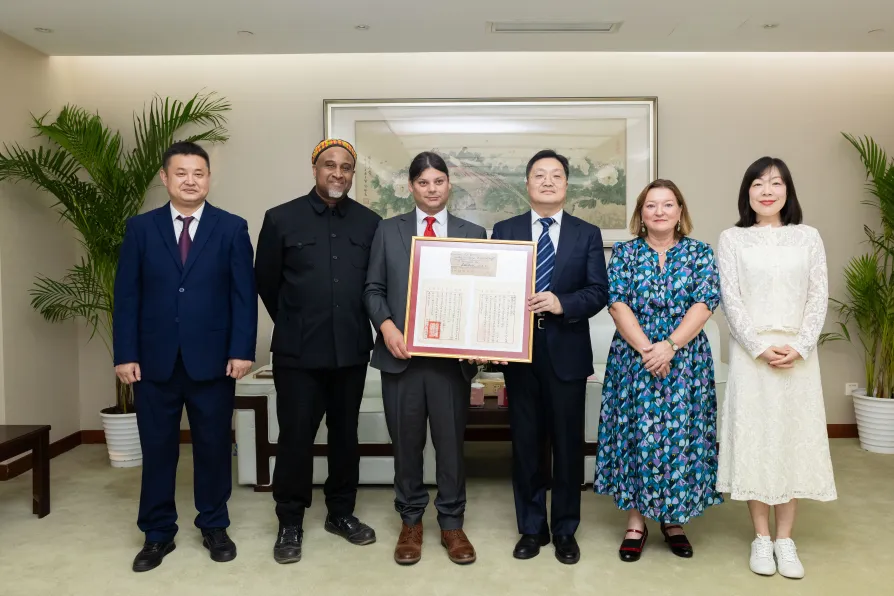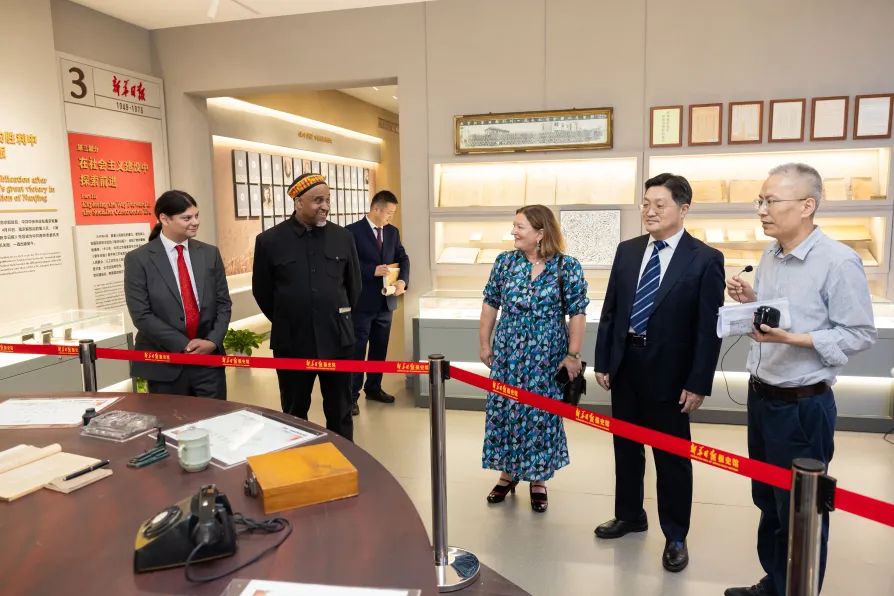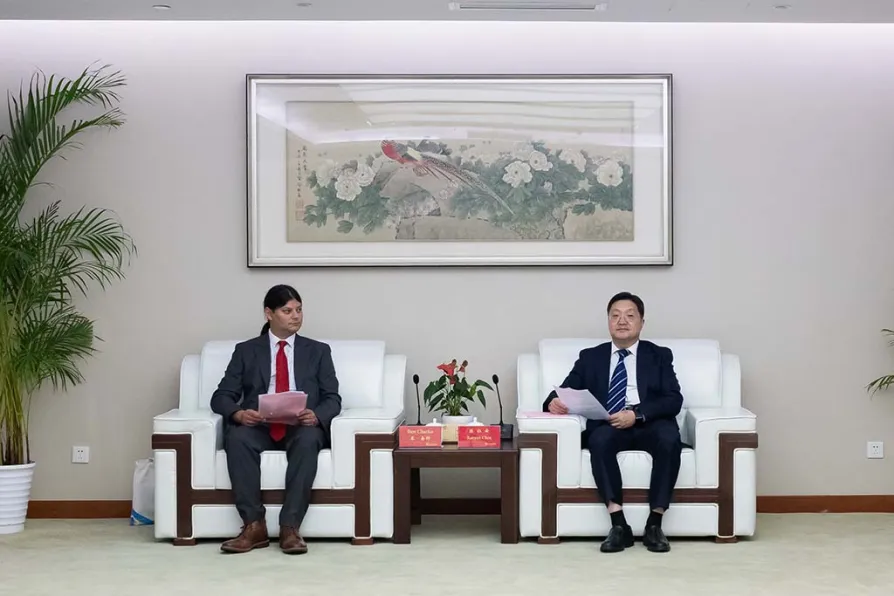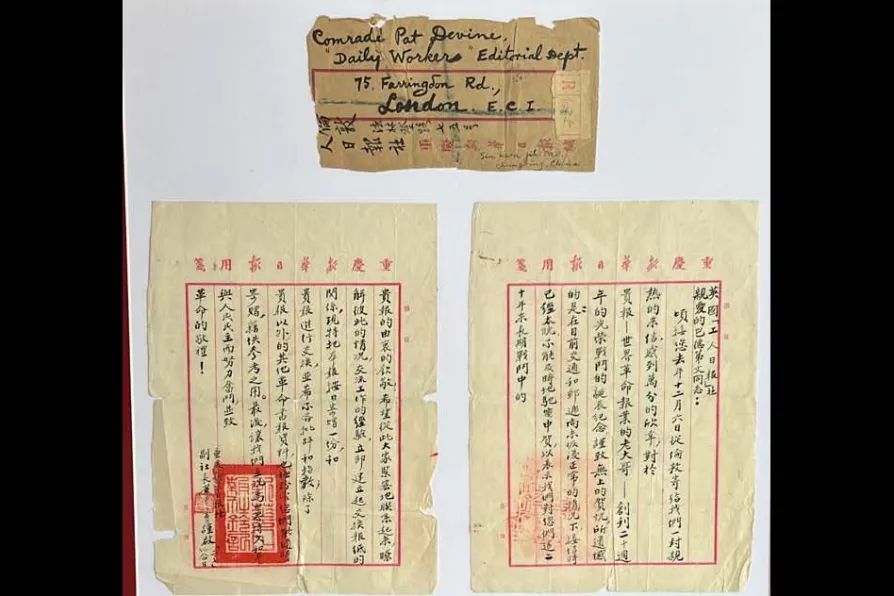John Wojcik pays tribute to a black US activist who spent six decades at the forefront of struggles for voting rights, economic justice and peace – reshaping US politics and inspiring movements worldwide
A chance find when clearing out our old office led us to renew a friendship across 5,000 miles and almost nine decades of history, explains ROGER McKENZIE

 The Morning Star hands over the historic letter to Xinhua Daily. L-R: Yang Zhihui, Roger McKenzie, Ben Chacko, Chen Renyun, Bernadette Keaveney, Shen Zhengrong
The Morning Star hands over the historic letter to Xinhua Daily. L-R: Yang Zhihui, Roger McKenzie, Ben Chacko, Chen Renyun, Bernadette Keaveney, Shen Zhengrong
A CHANCE find during an office move led a delegation from the Morning Star to a reception thousands of miles away in China this week to renew a decades-old comradeship.
While clearing out our old building in 2021, the Star’s stalwart assistant business manager Bernadette Keaveney came across a historic letter.
The letter, written in old style Mandarin from China’s Xinhua Daily to the Morning Star’s predecessor the Daily Worker in 1950, congratulates our paper on its 20th anniversary.
This rediscovery of the letter from the Nanjing, east China-based newspaper would not have been possible without Gloria Findlay, the widow of former Daily Worker international editor Pat Devine — the letter’s addressee. She sent the letter back to us after his death knowing it was an important piece of our history.
Keaveney, not a speaker or reader of Chinese, brought the letter to the attention of the paper’s editor, Ben Chacko, who has lived in China, as well as the Morning Star’s contacts at People’s Daily’s London bureau.
It was obvious to them that this pointed to a forgotten relationship with a Chinese newspaper — but it was only when we forwarded photographs to experts in China itself that the historic significance of the letter was fully appreciated.
It confirmed a longstanding friendship between two socialist newspapers forged in the fire of revolutionary change.
Xinhua Daily was founded by revered Chinese leader Zhou Enlai and other revolutionaries on January 11 1938. It was the first national newspaper published by the Communist Party of China in what was known as the National Unification Zone, and had been due to be established in Nanjing but was instead founded in Wuhan due to the Japanese invasion of China.
The Chinese newspaper was once described by former Chinese leader Mao Zedong as “a front of the party.” It enjoyed a unique history, moving headquarters first to Wuhan then Chongqing as the Japanese invaded China, and was the main legal voice of the Communist Party in the Nationalist-controlled areas under the wartime anti-Japanese alliance, though it was often subject to censorship.
We learned all about this history when invited to Nanjing to present the letter to the newspaper’s museum — an impressive and interactive educational space.

Not only did it detail the paper’s fascinating history, exhibits included a still working example of the printing press used to print the newspaper in the 1940s — some pages were run off for us to take home as souvenirs — a televised interview with a nonagenarian who was once one of the child sellers of the paper in the streets of Chongqing, and the original calligraphy from Chairman Mao spelling out “Xinhua Daily,” used as its masthead to this day.
One poignant room included the names and jobs of members of staff who were killed by Japanese military action, with a boat transporting its equipment along the Yangtze bombed by the Japanese air force. Some were represented by photographs, with white flowers representing those of whom no photograph survives. We told our hosts of the Daily Worker staff killed fighting fascism in Spain, and the bombing of our own printing press by the Luftwaffe in the Blitz, sharing a sombre moment in memory of our heroic forebears.
Xinhua Daily has developed into a modern media group with 13 newspapers, eight publications, 15 websites and more than 170 WeChat and Weibo accounts.
The historic bonds between the two newspapers lay dormant for many years. But Xinhua’s database shows that our sister paper reprinted hundreds of reports from the Daily Worker.
Remarks in the database where the Daily Worker describes Xinhua Daily as “China’s mouthpiece” speak to the collaboration between the two papers at a time when contact and collaboration would not have been easy to achieve.
During a formal ceremony at the Xinhua Daily History Exhibition in Nanjing, Xinhua vice-president Chen Renyun welcomed the delegation of Chacko, Keaveney and myself, saying the “Morning Star and Xinhua Daily have deep historical roots and similar values.”
Joined by international co-operation department leader Shen Zhengrong and cultural department and arts investment company general manager Yang Zhihui, Chen said: “Although the predecessor of the Morning Star, the Daily Worker, is far away from the Xinhua Daily, they are in the same voice and the same spirit, and they have become comrades-in-arms.
“This friendship, which crosses national borders and is based on common ideals, is not only a good saying in the history of the news of the two countries, but also a vivid embodiment of the spirit of international co-operation in media.”
The paper’s vice-president offered two ways for the two newspapers to renew and deepen the relationship.

“First, deepen content collaboration and consolidate the bridge of friendship.
”We can establish a business discussion mechanism, encourage editors and reporters to conduct regular research and dialogue, form a synergy in the study of international hot issues, and jointly improve the ability of international communication.”
Chen added that the two newspapers should “promote digital co-operation and embrace technological change.
“The two sides can explore co-operation in new media operation, activity linkage, etc, so that traditional friendship can be revitalised in the digital age.”
Chen added: “We look forward to more in-depth and broader exchanges and interactions between the two sides in the future.”
In his remarks, Chacko said it was “a great honour to be at the offices of the oldest newspaper in the People’s Republic of China, celebrating the relationship between your newspaper and our Morning Star, the only English-language daily socialist newspaper in the world.
“We are delighted to be presenting you with a testament to our shared history, the letter which you sent to the Morning Star’s predecessor title the Daily Worker, for preservation in your archives.”
Chen then presented the Morning Star with a framed copy of a Xinhua Daily front page from 1938 bearing a solidarity advert sending greetings to it from the Daily Worker.
The Star’s editor said that he was also excited to explore the further evidence uncovered by Xinhua of the relationship between the two papers during the “turbulent time of revolution, world war and the establishment of the People’s Republic.”
The letter was written soon after China’s 1949 revolution and as the world was entering a cold war between capitalist and socialist blocs.
It has been rediscovered at a time when the United States and its allies have chosen to promote a new cold war when, in stark contrast, China has sought to emphasise a shared pathway towards a future of peace and development.
Chacko said: “Today, China has celebrated three-quarters of a century of socialist construction, and just weeks ago marked 80 years since victory over Japanese imperialism.
“The magnificent commemoration parade showed China’s strength, and the Belt and Road Media Conference which we attended last week in Kunming was an inspiring demonstration of China’s commitment to peace and partnership across the world, for win-win co-operation and sustainable development.
“Hundreds of foreign guests attended the conference, many giving details of China’s internationalist outlook and the role it plays in the community of developing nations, providing finance and expertise that allow countries to choose their own paths to modernisation rather than be dictated to by the West.”
He added: “We are not here in China just to soak up information, but understand the responsibilities of being a media organisation, one whose front page each day proclaims our ongoing commitment to peace and socialism.”
Whilst Britain is not part of the Belt and Road Initiative, it has always seen part of its mission as being to spread understanding of China’s vision of an international community based on mutual respect and interdependence.
Chacko said: “We want to challenge those voices who present China’s rise as a threat to the West and seek to turn our countries against each other.”
The historic role of both newspapers has always been to expose fake news and to help chart a socialist future for the world.
The Morning Star’s developing collaboration with Chinese media is part of this process.
This included commemorating the centenary of the foundation of the Communist Party of China in 2021, and since then the paper has worked with the China Media Group, the People’s Daily, the Communist Party of Britain and the British solidarity organisation Friends of Socialist China to promote a better understanding of China in Britain.
“Comradeship is more than a piece of paper — this piece of paper’s importance comes from what it tells us about the collaboration of our newspapers across continents,” Chacko told the ceremony.
He added: “Like our past comrades who corresponded all those decades ago, we live far apart, but are united by our shared ideals.”
THE LETTER

The Daily Worker, United Kingdom
Dear Comrade Pat Devine
WE recently received your warm letter sent from London on December 6 last year, and we feel incredibly honoured and delighted. On the occasion of the 20th anniversary of your publication — the “Elder Brother” of revolutionary press worldwide — please accept our highest congratulations on this glorious and momentous anniversary.
Unfortunately, due to the current situation with transportation and postal services not yet being fully restored, we received your letter too late to send a timely letter expressing our heartfelt admiration for your publication’s long-standing commitment to the revolutionary cause over the past 20 years.
We hope that from now on, we can maintain close contact to stay informed about each other’s situations, exchange work experiences, and immediately establish a reciprocal newspaper exchange. Starting today, we are sending you a daily copy of our newspaper for exchange, and we look forward to receiving your valuable feedback and guidance.
In addition to your newspaper, we sincerely hope you can also send us other revolutionary books and materials as references whenever possible.
Finally, let us jointly extend our mutual salute to the enduring peace and people’s democracy worldwide, and let us work together in the spirit of revolutionary struggle.
With revolutionary greetings,
Vice-President
(blurred name, to be determined)
The Chongqing Xinhua Daily

One of the major criticisms of China’s breakneck development in recent decades has been the impact on nature — returning after 15 years away, BEN CHACKO assessed whether the government’s recent turn to environmentalism has yielded results

Morning Star editor BEN CHACKO reports from the start of Kunming’s Belt and Road media forum, where 200 journalists from 71 countries celebrated a new openness and optimism, forged by China’s enormous contribution to global development

This weekend's edition and the Country Standard supplement are free to read
Delegates at this year's conference can read the print edition in full









